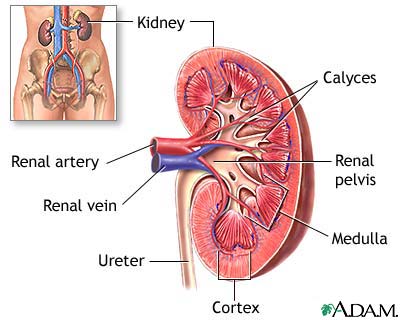Treatment
In most people, acute tubular necrosis is reversible. The goal of treatment is to prevent life-threatening complications of acute kidney failure during the time the lesion is present.

Treatment focuses on preventing the excess build-up of fluids and wastes, while allowing the kidneys to heal. Patents should be watched for deterioration of kidney function.
Treatment can include:
* Identifying and treating the underlying cause of the problem
* Restricting fluid intake to a volume equal to the volume of urine produced
* Restricting substances normally removed by the kidneys (such as protein, sodium, potassium) to minimize their buildup in the body
* Taking medications to help control potassium levels in the bloodstream
* Taking water pills (diuretics) to increase fluid removal from the kidney
Dialysis can remove excess waste and fluids. This can make you feel better, and may make the kidney failure easier to control. Dialysis may not be necessary for all people, but is often lifesaving, especially if serum potassium is dangerously high.
Dialysis may be needed in the following cases:
* Decreased mental status
* Fluid overload
* Increased potassium levels
* Pericarditis
* Total lack of urine production
* Uncontrolled buildup of nitrogen waste products
Prognosis (Expectations)
The duration of symptoms varies. The decreased urine output phase may last from a few days to 6 weeks or more. This is occasionally followed by a period of high urine output, where the healed and newly functioning kidneys try to clear the body of fluid and wastes.
One or two days after urine output rises, symptoms reduce and laboratory values begin to return to normal.
Complications
* Chronic renal failure
* End-stage renal disease
* Gastrointestinal loss of blood
* Hypertension
* Increased risk of infection
Calling Your Health Care Provider
Call your health care provider if your urine output decreases or stops, or if you develop other symptoms of acute tubular necrosis.
Acute tubular necrosis: Overview, Causes
Acute tubular necrosis: Symptoms & Signs, Diagnosis & Tests
Acute tubular necrosis : Treatment
Reviewed By : Parul Patel, MD, Private Practice specializing in Nephrology and Kidney and Pancreas Transplantation, Affiliated with California Pacific Medical Center, Department of Transplantation, San Francisco, CA. Review provided by VeriMed Healthcare Network. Also reviewed by David Zieve, MD, MHA, Medical Director, A.D.A.M., Inc.
